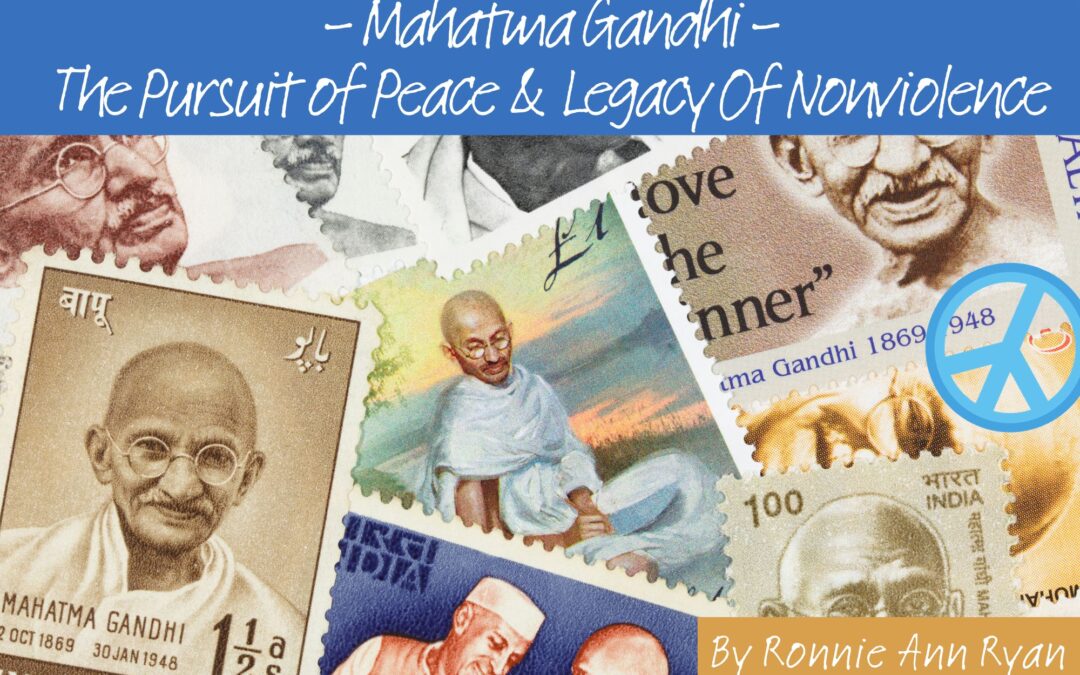Mahatma Gandhi, also known as the “Father of the Nation” in India, is an imposing figure in the global history of peace and nonviolence. His incredible life and peaceful philosophy still inspire millions around the world today.
Born on October 2, 1869, in Porbandar, India, Gandhi became a symbol of resistance against oppression, an advocate for justice, and a pioneer of nonviolent civil disobedience. His enduring legacy stems not only from India’s struggle for independence, but also from his profound impact on the international understanding of peace.
Gandhi’s Early Life
Gandhi’s journey to becoming an advocate for peace began early in life. Raised in a devout Hindu family, he embraced the principles of truth, compassion, and nonviolence from an early age.
He was Influenced by the teachings of great thinkers like Leo Tolstoy and Henry David Thoreau. This helped Gandhi develop a deep understanding of the power of nonviolent resistance as a force for social and political change.
The Emergence of Satyagraha
Mahatma’s commitment to nonviolence was first tested while living in South Africa (1893-1914), where he worked as a lawyer. Confronted with racial discrimination and injustice, he initiated his first major protest.
This was the birth of the nonviolent resistance movement known as “Satyagraha” which means “truth-force”. Through civil disobedience and peaceful protests, Gandhi sought to address the plight of the Indian community in South Africa which layed the foundation for his later endeavors in India.
India Struggles for Independence
Upon his return to India in 1915, Gandhi emerged as a leader in the struggle for independence from British colonial rule. One of his most iconic acts of nonviolent resistance was the Salt March in 1930.
Gandhi lead thousands of followers to march over 240 miles to the Arabian Sea to defy the British salt monopoly. There he symbolically and peacefully produced salt, an action that galvanized the Indian independence movement. The event also demonstrated the enormous potency of nonviolence as a means of challenging oppressive regimes.
Adopting Nonviolence as a Philosophy
Gandhi’s philosophy of nonviolence, or “ahimsa,” extended beyond political resistance. He saw this as a comprehensive way of life. He firmly believed that true nonviolence required inner transformation.
In addition, following this path called for a commitment to love and understanding even in the face of hatred. His teachings emphasized the interconnectedness of all living beings and the need for individuals to cultivate compassion and empathy.
His Legacy of Nonviolent Protest
Gandhi’s commitment to nonviolence became a guiding principle for other civil rights movements around the world. Leaders like Martin Luther King Jr., Nelson Mandela, and Cesar Chavez drew inspiration from his philosophy. They successfully employed nonviolent resistance in their respective struggles for justice and equality.
Gandhi’s legacy proves that peaceful means can lead to lasting change, a welcome change to thinking violence is the only way to address societal issues.
Adversaries of Nonviolence
While Gandhi’s philosophy of nonviolence is celebrated, it has also faced criticism and skepticism. Critics argue that nonviolence may not always be effective, especially in the face of brutal and oppressive regimes.
Yet, Mahatma insisted nonviolence was not simply passive acceptance of injustice. Instead, he saw this methodology as an active and powerful force that can transform both individuals and societies.
Gandhi’s View on Religion
Gandhi’s spirituality played a significant role in shaping his views on peace. He drew inspiration from various religious traditions, acknowledging the universal nature of spiritual values.
He believed that different religions were like different paths leading to the same truth, and sought to create unity among diverse communities through his philosophy of nonviolence.
Gandhi’s Influence Continues
Sadly, Gandhi’s life was cut short on January 30, 1948, when he was assassinated by a Hindu nationalist who opposed his efforts at religious harmony. Despite this tragedy, Gandhi’s legacy endures.
His principles of nonviolence, truth, and social justice continue to resonate globally. Even today his influence can be seen in movements for peace, human rights, and environmental sustainability.

